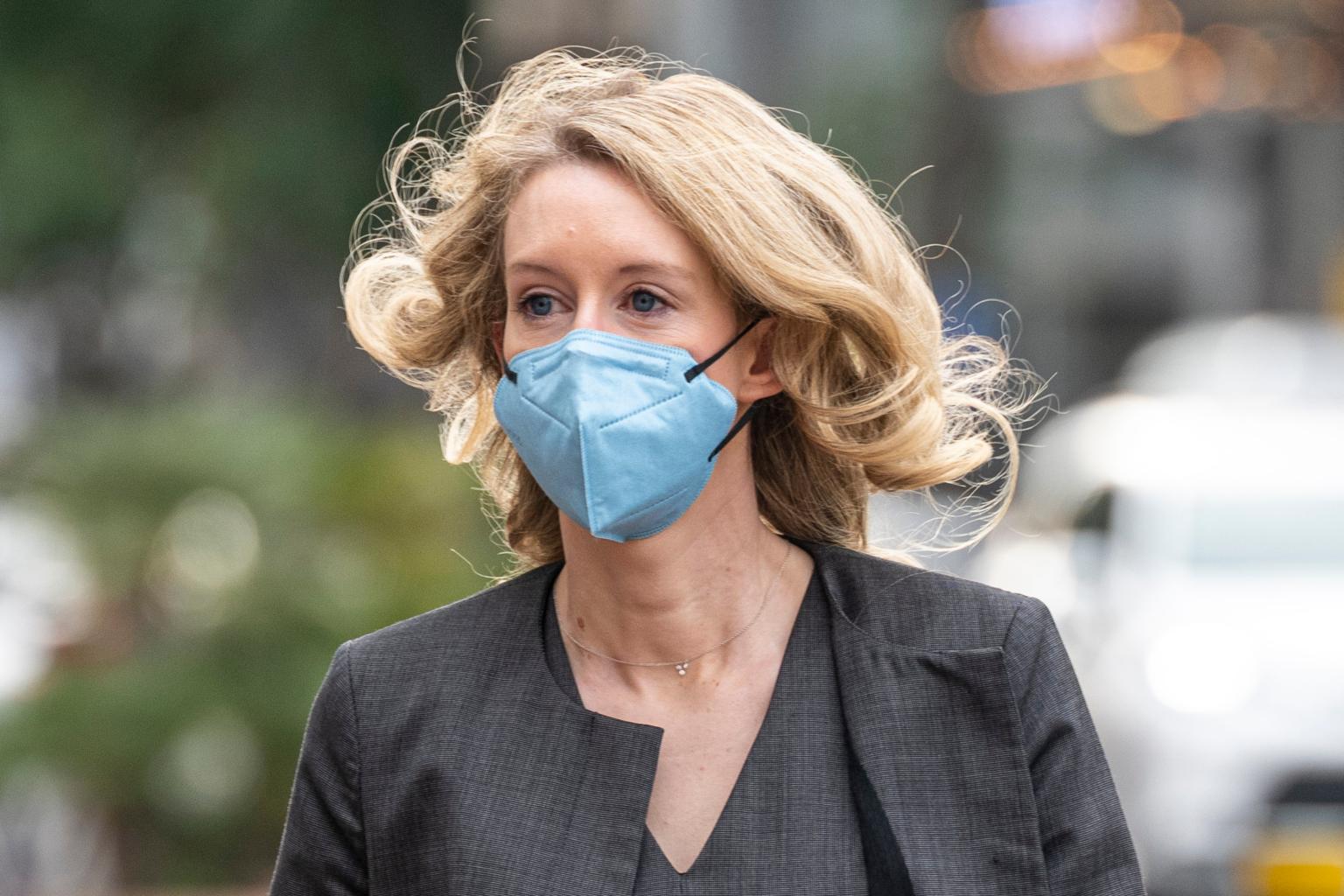Wigs, spectators, tears: Key moments in Theranos founder's trial
Sign up now: Get ST's newsletters delivered to your inbox

Theranos founder Elizabeth Holmes' case has long inspired fascination for its themes of money, celebrity and a stunning fall.
PHOTO: BLOOMBERG
Follow topic:
SAN FRANCISCO (AFP) - Theranos founder Elizabeth Holmes was once vaunted as the next Steve Jobs, but her Silicon Valley startup crashed under claims of deception and she was convicted on Monday (Jan 3) of defrauding investors.
Holmes's startup vowed to revolutionise diagnostics with self-service machines that could run an array of tests on just drops of blood, but her empire collapsed after it was revealed the testing machines didn't work as promised.
Her case has long inspired fascination for its themes of money, celebrity and a stunning fall - and her trial in California was laced with the same drama.
Here are some keys moments.
Blood energy drink
The line of journalists and spectators hoping to get a seat in the courtroom began forming on many days in the pre-dawn darkness outside the federal courthouse in San Jose, the heart of Silicon Valley.
Some people reportedly were paid to save spots in line for the limited number of tickets, which were handed out by court workers and guaranteed entrance to their bearers.
The crowd rushed to get pictures of Holmes as she walked to the courthouse entrance, usually hand-in-hand with her mother.
The gathered crowd included journalists and curious members of the public, but also on at least one occasion look-alikes, complete with blond ponytails and black clothes considered the disgraced entrepreneur's trademark look.
Some of those waiting shouted support for Holmes on her way in, which prompted Judge Edward Davila to note concern it could influence jurors.
In late November the waiting masses snapped pictures for Twitter of seeming performance art by a woman selling blond wigs, black turtleneck tops and cans of "blood energy drink" from a suitcase.
God's tigress and warrior
In a risky move, 37-year-old Holmes testified in her own defence, pitting her word against the testimony of more than three dozen witnesses called by the prosecution.
Holmes aimed to convince jurors that she believed in her technology, and that it was on the cusp of living up to its promise when the startup crashed.
She fought back tears as she recounted alleged abuse by then boyfriend Ramesh "Sunny" Balwani, whom she'd brought in to help run her company. Balwani has also pleaded not guilty. His trial is slated to begin soon.

Holmes said Balwani denigrated her and forced himself on her sexually when angry - accusations that he has forcefully denied.
The prosecutor challenged Holmes's testimony of being bullied by Balwani, having her read message exchanges between the two in which they declared their love.
"You are God's tigress and warrior. You are extraordinary. I love you," Balwani wrote in one note to Holmes.
Girlboss merch
Holmes's trial became a battlefield for the debate about whether a woman entrepreneur was being prosecuted for the kind of "fake it til you make it" tactics regularly seen in male-dominated Silicon Valley.
Her defenders and fans, sometimes called "Holmies", were able to display their backing with an extensive array of merchandise featuring her image.
T-shirts, stickers, posters, coffee mugs and cell phone cases were all available for purchase online in support of Holmes, some bearing the title "Girlboss".
As Holmes's trial opened in September, dozens of listings were online as part of a cottage industry in honor of the fallen biotech star.
One seller, under the name WeAreElizabethHolmes on ecommerce site Etsy, had a Twitter account with images of T-shirts, coffee mugs and even a throw pillow.
The account cites its favourite entrepreneur: "First they think you're crazy, then they fight you, then you change the world." Holmes spoke those words in a 2015 interview as she fought against the Wall Street Journal reporting casting doubt on Theranos's technology, and which would induce the firm's collapse.
Billions of dollars
Holmes testified that she dropped out of California's elite Stanford University and started Theranos at the age of 19, using money set aside to pay for college.
In the years after Theranos was founded in 2003, Holmes gathered some US$700 million (S$950 million) from investors. She held the majority stake in the startup, valued at US$10 billion at its peak in 2015.
Her wealth on paper made her the first woman to reach such financial heights by building her own business.
Holmes testified during trial that she never sold a share of her stake in Theranos, leaving her with nothing after the company's collapse.
She was, however, paid more than a million dollars overall in salary during her years as chief, Holmes testified.

